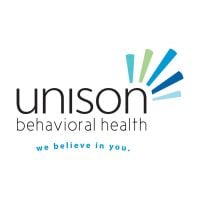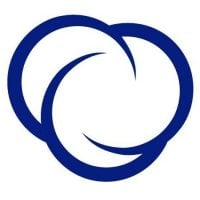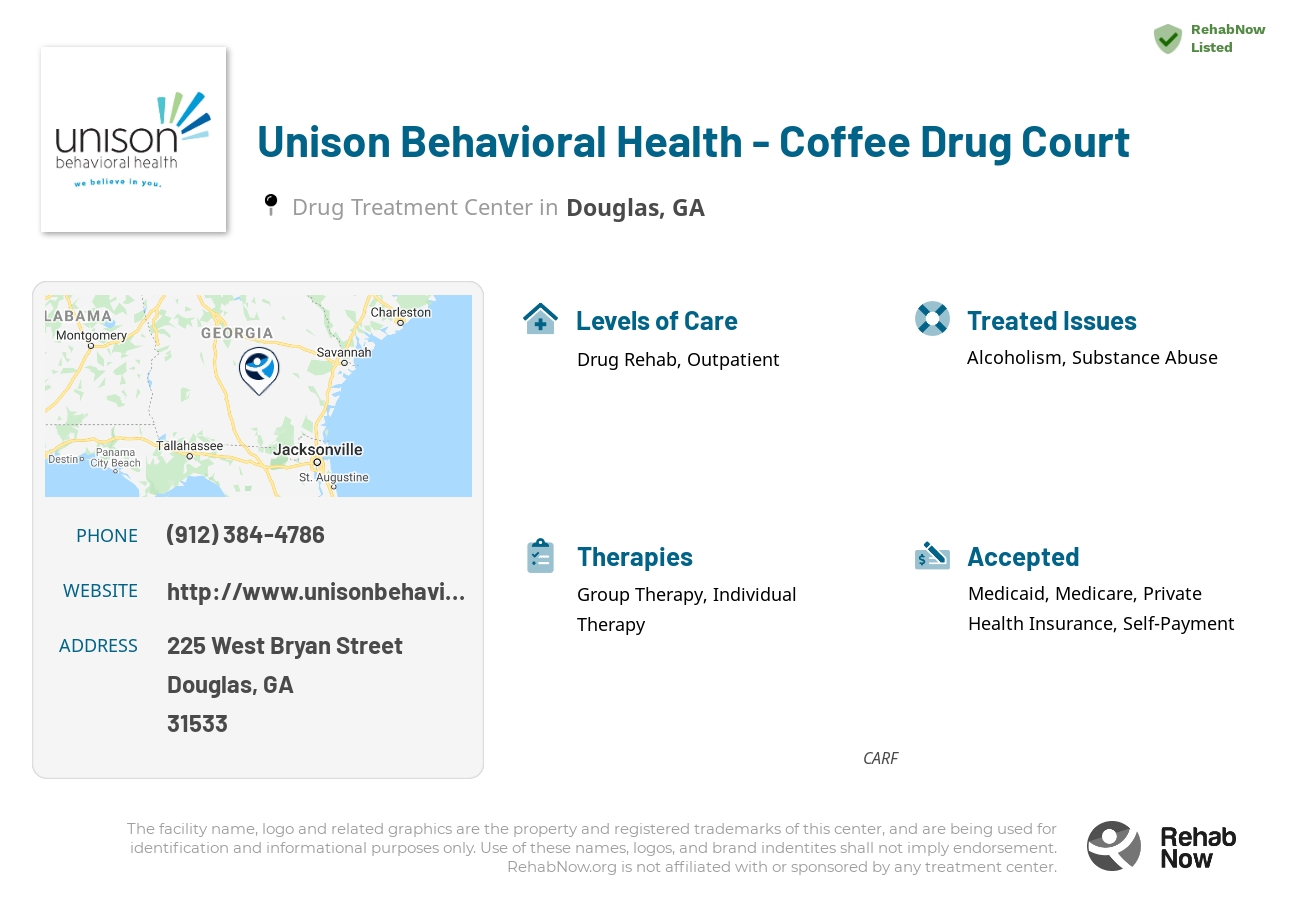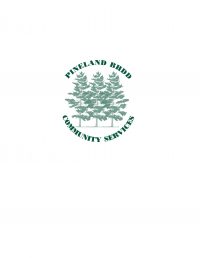
Unison Behavioral Health - Coffee Drug Court
Drug Rehab Center in Douglas, Georgia
- Substance Abuse
- Opioid Addiction
- Dual Diagnosis
- Drug Addiction
- Alcoholism
Unison Behavioral Health offers an accredited, comprehensive drug rehabilitation program in Douglas, GA, that is staffed by experienced personnel and accepts most private health insurance plans.
About This Georgia Facility
Unison Behavioral Health - Coffee Drug Court, situated in Douglas, Georgia, focuses on overcoming alcoholism, drug addiction, and substance abuse. Distinguished by its comprehensive approach and state-of-the-art facilities, this public rehab caters to individuals seeking a personalized path to recovery, emphasizing their strengths, needs, abilities, and preferences.
Accredited by CARF, Unison Behavioral Health - Coffee Drug Court showcases its commitment to excellence in addiction treatment. With a treatment spectrum that encompasses detoxification, residential, outpatient services, and recovery programs, the facility tailors its evidence-based practices to fit each individual's unique requirements, ensuring a holistic recovery journey.
- Comprehensive treatment spectrum: From detoxification to recovery programs, all tailored to meet individual needs.
- Evidence-based practices: Utilizes cognitive and dialectical behavior therapies among others for effective treatment.
- CARF Accredited: Ensures high standards of care and excellence in behavioral health services.
At Unison Behavioral Health - Coffee Drug Court, individuals struggling with alcohol and substance abuse disorders, including opioid addiction and dual diagnoses, find a supportive environment. They benefit from a variety of treatment methods, including medication-assisted treatment, individual and group counseling, as well as relapse prevention, aimed at fostering long-lasting sobriety.
Genders
Ages
Modality
Additional
Accreditations

CARF
The Commission on Accreditation of Rehabilitation Facilities (CARF) is a non-profit organization that specifically accredits rehab organizations. Founded in 1966, CARF's, mission is to help service providers like rehab facilities maintain high standards of care.
Conditions and Issues Treated
People who abuse drugs are likely to suffer from an addiction, which can cause serious health problems. When it comes to helping drug abusers get sober, there are many options to choose from. It is essential to state that there is no “”correct”” way of doing things. People are different, and they need different types of help to get over their addiction.
Many people who struggle with opioid addiction need to attend specific programs like methadone , Suboxone or Vivitrol clinics.
These types of programs will provide the patient with legal, prescription medications that can help them overcome their cravings for illegal opioids like heroin or fentanyl . If the patient has a chronic condition like Hepatitis C, they must undergo treatment before they can begin taking these medications.
Levels of Care Offered at Unison Behavioral Health - Coffee Drug Court
This center offers a variety of custom treatment tailored to individual recovery. Currently available are Detox, Drug Rehab, Outpatient, Residential, with additional therapies available as listed below.
An addict may have to go through alcohol or drug withdrawal. While detox may be uncomfortable, it is not life-threatening. Detoxification allows the addict to rid the body of all traces of drugs or alcohol and gives the addict a clean slate for their recovery. In an inpatient or outpatient setting, detox can be managed medically.
Outpatient treatment programs provide drug and alcohol addiction treatment through individual sessions with a counselor, group therapy, 12-step meetings, and other activities to help individuals gain sober living skills. Most programs are designed for those individuals who have completed a medically supervised detoxification program and provide opportunities for clients to begin the process of early recovery.
Outpatient programs also offer a level of medical support as needed and psychological backing through therapy. Clients are encouraged to live at home, though there may be some flexibility regarding this requirement based on the circumstances and needs of each patient.
Outpatient treatment is perhaps the most common type of dual diagnosis program available. It does not pose a significant financial burden on patients. However, it is essential to note that outpatient treatment does not provide the support and supervision given in residential programs. Some addicts may need this level of support to maintain their sobriety.
Residential treatment programs are those that offer housing and meals in addition to substance abuse treatment. Rehab facilities that offer residential treatment allow patients to focus solely on recovery, in an environment totally separate from their lives. Some rehab centers specialize in short-term residential treatment (a few days to a week or two), while others solely provide treatment on a long-term basis (several weeks to months). Some offer both, and tailor treatment to the patient’s individual requirements.
Therapies & Programs
Therapy sessions focused on the individual addict can provide much-needed guidance as they work toward overcoming their addiction. These types of sessions typically involve guidance from a therapist, who will help addicts identify and process their feelings and cravings.
During these sessions, addicts may develop plans for coping with the triggers that typically lead to relapse and learn how to avoid those triggers during their recovery process.
The main goal of family therapy for drug addiction is to create an environment where communication can occur without judgment, hostility, or blame that often occurs within a family.
Family therapy is a type of group problem-solving that aims to improve communication and relationships between the patient, their family, and sometimes friends. The therapist is with the family as they learn to communicate with each other differently, especially with the addict when s/he is using.
The family can learn to reduce their enabling behavior or rally together and support each other during tough times. The patient also learns how to deal with their addiction and maintain sobriety while interacting with the family.
Different types of addiction treatment services are available. Within this article, group therapy is of interest due to its high success rate compared to individual therapy. Group therapy settings are beneficial because they allow recovering addicts to build a strong support network.
Benefits of group therapy are:
- Reduces feelings of isolation
- Immediate access to social support in the form of fellow addicts in recovery
- Lowers risk of relapse
- Increases rate of sobriety
- Builds coping skills that can be applied to everyday life
Those struggling with addiction in Georgia can benefit from learning certain life skills. It is not as simple as quitting drinking or taking drugs and thinking that the hard part is over. Being sober means living a whole new way of life. Many recovering addicts have found that they need to develop talents like time management, organization, communication skills, socialization skills, and self-esteem to make their life in sobriety work.
Drug and alcohol addiction can lead to a breakdown in life skills. Learning certain life skills can help those who are struggling with addiction. Life skills training at Unison Behavioral Health - Coffee Drug Court in Douglas, GA teaches patients skills such as time management, budgeting, and social abilities to improve their quality of life and prevent relapse.
An addict’s life skills are maladaptive, meaning they are counterproductive. An addict may have learned poor time management skills growing up, have a hard time budgeting money, or be socially awkward. An addict’s poor life skills can lead to relapse and the inability to achieve long-term sobriety. Life skills training teaches patients effective coping mechanisms, which can help them live a clean and sober life.
Payment Options Accepted
For specific insurance or payment methods please contact us.
Is your insurance accepted?
Ask an expert, call (888) 674-0062
Unison Behavioral Health Associated Centers
Discover treatment facilities under the same provider.
- Unison Behavioral Health - Saint Illa Center in Waycross, GA
- Unison Behavioral Health - Alma in Alma, GA
- Unison Behavioral Health - Ware County in Waycross, GA
- Unison Behavioral Health - Nahunta in Nahunta, GA
- Unison Behavioral Health - Charlton County in Folkston, GA
Learn More About Unison Behavioral Health Centers
Additional Details
Specifics, location, and helpful extra information.
Douglas, Georgia 31533 Phone Number(912) 384-4786 Meta DetailsUpdated April 15, 2024
Staff Verified
Patient Reviews
There are no reviews yet. Be the first one to write one.
Douglas, Georgia Addiction Information
Prescription opioid use has caused a large increase in the total amount of overdoses in Georgia. Almost 12% of the Georgia population uses illicit drugs each year, and slightly over 3.5% also abuses alcohol at the same time. This does not include those who binge-drink at least once a month, which includes 20% of all Georgians.
Treatment in Nearby Cities
- Cairo, GA (90.9 mi.)
- Hiram, GA (198.0 mi.)
- Hamilton, GA (146.7 mi.)
- Doraville, GA (185.2 mi.)
- Augusta, GA (144.6 mi.)
Centers near Unison Behavioral Health - Coffee Drug Court



The facility name, logo and brand are the property and registered trademarks of Unison Behavioral Health - Coffee Drug Court, and are being used for identification and informational purposes only. Use of these names, logos and brands shall not imply endorsement. RehabNow.org is not affiliated with or sponsored by Unison Behavioral Health - Coffee Drug Court.





